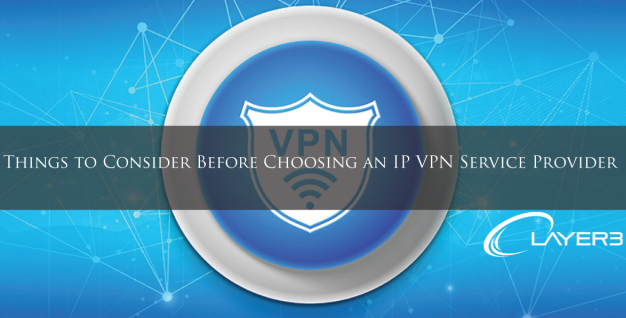Telecom
Things to Consider Before Choosing an IP VPN Service Provider

You want secure networks for your organization. Currently, you’re using VPNs. But you’ve been told that IP VPNs are an even better option, as they offer extra protection against security risks.

Now you’re wondering whether you should transit to IP VPN or stick with what you currently use. Maybe you don’t know much about the new option, and you’re not conversant with your existing solution either. What’s the superior alternative? What should you go with?
This article is a guide to answering these questions.
Let’s begin by explaining some of the terms involved.
An IP (Internet Protocol) address is a number that is given to every device that connects to the internet. It’s like a ‘name’ or means of identification for each device; no two devices bear the same number.
Besides identifying the device (and, by extension, its user), it also indicates the location of the user and their device. For instance, you can tell what country a person is in through their IP address.
A VPN (Virtual Private Network) is a network setup that lets its users connect to their organizations’ internal network remotely via the public internet. It makes it possible for employees to access their company’s shared files from locations outside its physical offices.
An IP VPN functions in a similar way to a regular VPN. But there’s at least one difference: IP VPN connects to internal networks via private gateways, rather than the public internet.
How IP VPN Works
IP VPN utilizes something called Multiprotocol Label Switching (MPLS) to allow the user to get to their organization’s intranet while avoiding the public internet.
The MPLS sorts the bits of data passing through the World Wide Web into appropriate groups—video, voice, or images for instance. It also speeds up the transmission of these data to their destination.
Why Choose an IP VPN Instead of a VPN?
An IP VPN can help you expand your bandwidth and increase uptimes for your applications. It’s not as susceptible to DoS (Denial of Service) attacks as a regular VPN. Because it functions away from the public internet, it’s not vulnerable to many of the threats that come through the broader web.
What to Consider Before Choosing an IP VPN Provider
Many firms offer IP VPN as a product. But they won’t all give you the same quality of service. That’s why you need to know what to look out for when prospecting for a service provider in this area.
Here are some things you should consider.
- Security
This is one reason why you want to get an IP VPN in the first place, so you should be sure that your vendor’s offering will guarantee it. If you find that the details related to this are too technical, you should ask your IT team to look at what’s being offered. They may spot defective aspects of the product, or give it an all-clear, depending on the results of their assessment.
- Speed
Your IP VPN should give you the advantage of a higher speed connection, compared to the public internet. Several factors will affect the speed of your network, including some localized to your organization or location. But it may be a function of the quality that a vendor can provide. So you should consider the reputation of various vendors in this area before deciding which one you will go with.
- User Friendliness
Can you use the service without much help? Or is it so complex that you require a technician to help you with it?
Your IP VPN should give you good user experience. The fact that it’s somewhat advanced technology isn’t an excuse for complexity. If you can’t navigate it yourself after a few tries, it’s probably not worth your while.
- Access
This service lets you connect all your business locations to your organization’s internal files and other resources. A high-grade IP VPN should enable you to achieve quick access to your business’s intranet regardless of where you are.
- Price
It’s important to compare prices too, where you can. Look for an IP VPN provider that gives the best balance of price and quality that matches your needs. On one hand, unusually low prices may indicate less than optimal product quality. But there may be a less expensive option than the pricey IP VPN services that are just as effective.
- Support
What happens if you run into some difficulty while using an IP VPN? Is the service provider always available to take on your requests for help?
Support is an important part of any IT vendor’s package. They should have resources that cover the issues you are most likely to encounter while using their service. You should also be able to speak with their agents when this is the more helpful thing to do.
Should You Choose a VPN or IP VPN?
You can settle with a regular VPN if:
- You are a small business with little need for the sort of expanded bandwidth that IP VPN gives.
- You don’t have a lot of staff working remotely.
- There’s no significant IT security threat.
Consider using an IP VPN if you meet these criteria:
- You are a medium or large scale business that has to deal with a lot of traffic on your networks.
- A lot of your employees work remotely.
- There’s a potential but significant IT security threat to your organization.
Final Words
There’s a lot that Virtual Private Networks can do for your company. With IP VPNs you can achieve even more. Whether it’s securing your banking details or raising the efficiency of your VoIP systems, this technology can make your operations much easier and more secure.
When you weigh up your options for an IP VPN service provider, you’ll certainly prefer one that’s been around for a while. You will also want them to know the peculiarities of the environment you work in.
That’s what you get with Layer3. For over 14 years, we have helped organizations in the public and private sectors with IT solutions they need to function optimally. We bring this experience to bear in our delivery of IP VPN services. Our team can deploy one that suits your specific needs, and provide expert management and support along with it.
If you would like to find out more about our access solutions, you can contact us here.
Telecom
Banks, Telcos Settle Four-Year Dispute over N300Bn USSD Debt

Banks and telecommunications operators in Nigeria have ended a four-year dispute over nearly N300bn owed for Unstructured Supplementary Service Data services (USSD), with the debt now fully cleared, according to Association of Licensed Telecommunications Operators of Nigeria (ALTON).

Gbenga Adebayo, chairman, announced the resolution on Thursday during an official visit to Idris Olorunnimbe, chairman, Nigerian Communications Commission (NCC).
He credited the intervention of the NCC, led by Dr Aminu Maida, executive vice chairman of the commission, with bringing the long-standing dispute to a close.
“When Dr Maida assumed office, he inherited significant industry challenges,” Adebayo said.
“One of the most difficult was the USSD debt crisis, a debt burden that grew over four years to nearly N300bn. It had become a systemic risk to our sector and the digital financial ecosystem.
Through firm leadership, structured engagement, and decisive coordination, Dr Maida and his team resolved this issue.
Today, there is no outstanding USSD debt. The ecosystem has fully migrated to end-user billing. What was once a looming crisis has been converted into a sustainable framework.”
The clearing of the debt ends years of accusations and counter-accusations between banks and telecom operators, which had threatened the stability of digital financial services in the country.
Adebayo praised the NCC’s leadership for steering the telecom sector through one of its most delicate periods, noting other interventions, including last year’s approval of a 50 per cent USSD tariff.
He described the resolution of the debt crisis as a milestone for the telecom and digital finance ecosystem, ensuring sustainability and predictability for operators and service providers.
Nigeria’s telco and bank billing for USSD services transitioned to the end-user billing model in mid-2025, moving charges from bank accounts to customers’ mobile airtime, which is deducted directly by telecom operators.
This shift resolved the long-standing dispute in which banks owed operators up to N300bn in unpaid USSD fees.
The transition arose from years of tension between telecom operators, including MTN and Airtel, and banks over USSD revenue sharing, with debts peaking at N250–300bn by 2024.
The NCC, in collaboration with the Central Bank of Nigeria, developed the EUB framework to standardise billing, enhance transparency, and support financial inclusion for unbanked users who rely heavily on USSD codes.
Under the EUB system, charges are now deducted directly from mobile airtime at N6.98 per session lasting up to 120 seconds, with user consent prompts issued before each deduction. Banks no longer bill for USSD services; telcos handle them exclusively, with regulatory safeguards preventing double-billing. Users can opt in or out of the service, and banks are required to notify customers in advance of any USSD session charges.
Migration to the EUB model began between June 3 and 18, 2025, following partial debt repayments amounting to N171bn. By February 19, 2026, banks had fully cleared the remaining debt, solidifying the EUB rollout.
The model improves user control through immediate airtime deductions and session notifications, similar to voice and SMS billing. While some critics have expressed concern over potential burdens on low-income users, the transition strengthens telecom revenue sustainability and contributes to the stability of Nigeria’s digital financial ecosystem.
Credit: Punch
Telecom
MTN, FAAN Unveil Free WiFi @ Lagos, Abuja Airports

Federal Airports Authority of Nigeria (FAAN) and MTN Nigeria have launched free, high-speed WiFi services for passengers at the international wing of the Murtala Muhammed Airport in Lagos and the Nnamdi Azikiwe International Airport in Abuja.

The partnership, both bodies explained, will be followed up with similar development taking place at the airports in Kano, Port Harcourt and Enugu within the next few months.
Mrs Olubunmi Kuku, managing director of FAAN, officially unveiled the internet service at MMIA Terminal two.
Kuku, who was represented by Capt. Abdullahi Mahmood, director of Airport Operations, described the initiative as a major milestone partnership for the aviation ecosystem.
The FAAN boss said the milestone marked a new benchmark in digital infrastructure and passenger experience across Nigerian airports.
According to her, the free WiFi service will be extended to the MMIA Temporary Terminal within weeks, before extension to Enugu, Port Harcourt, and Kano international airports over the next three months.
“In 21st century Nigeria, no Nigerian airport should be an offline island.
“This collaboration with MTN Nigeria demonstrates how effective Public-Private Partnership (PPP) alignment can modernise infrastructure and strengthen the country’s digital economy,” she said.
Kuku assured travellers that FAAN was committed to closing service gaps and enhancing operational efficiency across airports nationwide.
“This WiFi is our promise that FAAN is listening. We have turned on the signal today, but the signal we are truly sending is this: Nigerian aviation is writing a new chapter; one of innovation, partnership, and unwavering commitment to excellence,” she said.
Kuku said the project was a key component of the digital economy agenda led by President Bola Tinubu and the transformative vision of Mr Festus Keyamo, minister of Aviation.
She commended MTN Nigeria for its technical expertise and investment in the project, describing the partnership as purpose-driven and transformative.
On his part, Mr Karl Toriola, chief executive officer of MTN Nigeria, who was represented by Lynda Saint-Nwafor, chief enterprise business officer, assured passengers that the service would be reliable, secure and efficient.
“We are proud to announce the launch of a free WiFi service across major airports in Nigeria in partnership with FAAN.
“This initiative reflects a shared commitment to improving passenger experience and enhancing digital accessibility,” Toriola said.
He noted that airports served as critical gateways for business travellers, tourists, airport personnel and service providers, all of whom required seamless connectivity.
“With this service, travellers waiting to board, in transit, or upon arrival can now stay connected freely and effortlessly,” he added.
MTN Nigeria also announced plans to activate on-ground engagement campaigns at the Lagos and Abuja airports over the next month to drive awareness and encourage usage.
According to the telecom giant, the project reinforces its commitment to national infrastructure development and expanding digital access in public spaces.
Telecom
NCC Mulls Sanction on Road Contractors Destroying Metro Fibre of Telcos

Nigerian Communications Commission (NCC) is considering imposing sanction on any road contractor that destroys telecommunications metro fibre across the country.

Idris Olorunnimbe, chairman, Board of Commissioners, NCC, stated this at congratulatory visit to the Chairman by members of Association of Licensed Telecommunications Operators of Nigeria (ALTON) in Lagos yesterday.
According to him, “I think what we need to do to address the damage of metro fibre by government contractors is simply. He who cuts It must fix it, and we’ll take this message to our state governments.
If any contractor knows that if they damage that critical national infrastructure, their work is going to stop and they are going to be the ones to fix it, they will not destroy it.
Responding, Engr. Gbenga Adebayo, chairman, Association of Licensed Telecommunications Operators of Nigeria (ALTON), said up until now, there are no consequences for those infractions, and if there are no consequences, the tendency to continue to do bad is very high.
“Contractors of government carrying out roadworks, whether road maintenance or road expansion, and their machines destroy communications super highway at will, if there are consequences, or if there were consequences some of those actions will not have escalated to the level that we are in.
“What the chairman has said today is very important, if you destroy it you fix it. What we are expecting now is that the consequence of managing those problems will be a lot more, and there will be legal deterrent for people from destroying operators’ fibre. I must emphasize the communication super highway. That’s the highway by which all the signals are carried.
“When this highway is broken, it’s like you have a major bridge that’s broken. You can’t reach east, neither can you reach west. And until we take it as the major super communications highway and so protective, we will continue to be where we are.
“That’s actually what it is. When this highway is broken, we are all affected. So, it’s no longer an infrastructure that is for operators, but it belongs to all of us. If I don’t have service on my phone, some of these are the consequence of this violation that we are seeing.
Earlier in his welcome address, Engr. Adebayo highlighted some of the key challenges in the sector which includes: Daily fibre cuts — often caused by federal and state road construction contractors — are creating enormous economic losses.
- Nationwide service disruptions
- Destruction of critical digital infrastructure
- Loss of assets without compensation
- Banking, education, and security interruptions
There is currently insufficient institutional recourse for operators when these damages occur. A structured pre-construction fibre mapping and mandatory coordination framework is urgently required.
Key Regulatory Priorities for Sector Stability
- Independence of the Regulator
He said regulatory independence ensures:
- Credible oversight
- Investor confidence
- Transparent decision-making
- Long-term sector stability
Independence must not only exist in law — it must be visible in practice.
“We recommend: Legislative reinforcement explicitly affirming NCC independence
- Clear codification of interaction boundaries between the regulator and supervising authorities
- Operational safeguards insulating regulatory processes from undue influence
Multiple Regulation
Overlapping regulatory interventions by various MDAs on matters already within NCC jurisdiction create:
- Duplicative investigations
- Conflicting directives
- Increased compliance costs
- Regulatory uncertainty
“We recommend structured inter-agency coordination frameworks and legislative clarification reaffirming NCC’s exclusive jurisdiction over telecommunications matters.
Multiple Taxation
Adebayo stated that operators continue to face excessive sub-national taxes and levies.
Enforcement tactics such as site shutdowns directly affect Quality of Service and national connectivity.
A harmonized national telecom taxation framework is essential for broadband expansion and digital inclusion.

 Telecom2 days ago
Telecom2 days agoTerra Moves to Expand in African Drone Sector, Secures $22m Funding

 Telecom2 days ago
Telecom2 days agoTemu Assures Compliance Amid Nigeria Data Privacy Probe

 E-Financial2 days ago
E-Financial2 days agoDMO Offers ₦800bn FGN Bonds in February Auction Surge

 E-Financial2 days ago
E-Financial2 days agoDanjuma, Taj Bank Staff Jailed for 5 Years over N22m Fraud

 E-Financial2 days ago
E-Financial2 days agoKPMG Outlook Reveals Financial Services CEOs Double down on AI, Resilience and Growth in 2026

 Telecom3 days ago
Telecom3 days agoMTN Group Announces Proposed Full Acquisition of IHS Towers

 News2 days ago
News2 days agoChianugo, Nigerian $150m suit Against Google, GoDaddy.com Stalled due Judge’s Absence

 General News2 days ago
General News2 days agoFG to Review MTN’s $6.2Bn IHS Acquisition — Tijani


























